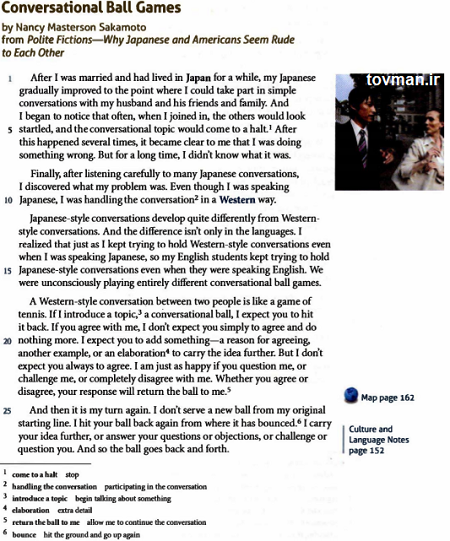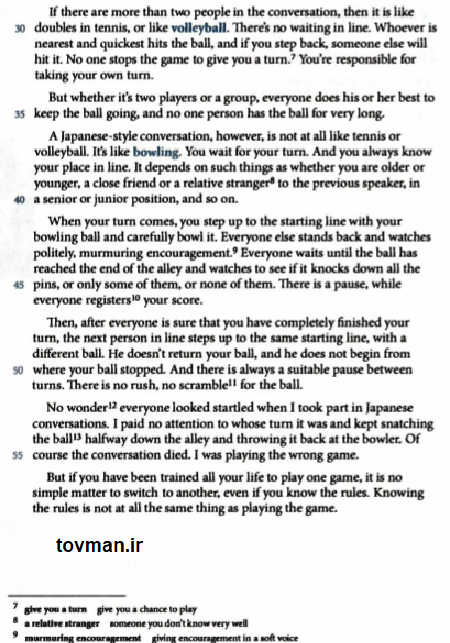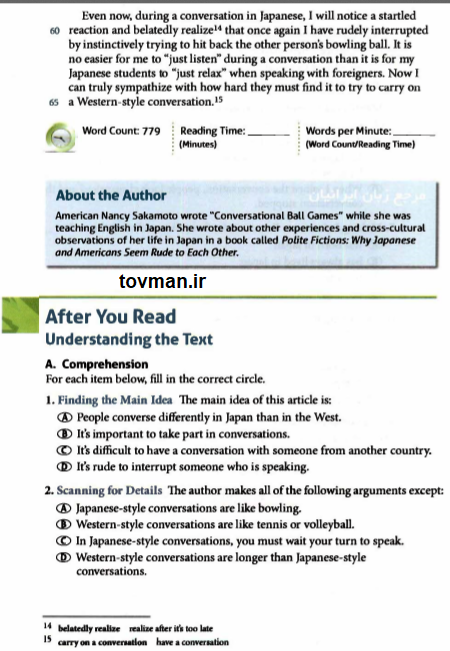
Conversational Ball Games
مکالمه ها در بازیهای توپی
by Nancy Masterson Sakamoto from Polite Fictions-Why Japanese and Americans Seem Rude to Each Other نوشته شده توسط نانسی ماسترسون ساکاموتو از داستان های مودبانه چرا ژاپنی ها و آمریکائی ها نسبت به هم بی ادب به نظر می رسند



After I was married and had lived in Japan for a while, my Japanese gradually improved to the point where I could take part in simple conversations with my husband and his friends and family. And I began to notice that often, when I joined in, the others would look startled, and the conversational topic would come to a halt.۱ After this happened several times, it became clear to me that I was doing something wrong. But for a long time, I didn't know what it was
بعد از این که ازدواج کردم و برای مدتی در ژاپن زندگی کردم، زبان ژاپنی ام به تدریج بهتر شد تا جایی که می توانستم در گفتگوهای ساده با همسرم و دوستان و خانواده اش شرکت کنم. و من متوجه شدم که وقتی من به آنها ملحق می شوم دیگران بهت زده به نظر می رسند و موضوع گفتگو متوقف می شود. پس از اینکه این مسئله چند بار اتفاق افتاد برایم مشخص شد که کار اشتباهی را انجام می دهم اما برای مدتی طولانی نمی دانستم که آن چیست.
Finally, after listening carefully to many Japanese conversations, I discovered what my problem was. Even though I was speaking Japanese, I was handling the conversation in a Western way
سرانجام پس از گوش دادن با دقت به تعداد زیادی از مکالمات ژاپنی، فهمیدم مشکل من چی بود. اگرچه من ژاپنی صحبت می کردم اما من در گفتگوها به سبک غربی شرکت می کردم.
Japanese-style conversations develop quite differently from Westernstyle conversations. And the difference isn't only in the languages. I realized that just as I kept trying to hold Western-style conversations even when I was speaking Japanese, so my English students kept trying to hold Japanese-style conversations even when they were speaking English. We were unconsciously playing entirely different conversational ball games
مکالمات به سبک ژاپنی کاملاً متفاوت از سبک غربی است و تفاوت تنها در زبان نیست. فهمیدیم که درست همانطور که من سعی می کنم سبک مکالمه غربی را وقتی ژاپنی صحبت می کنم، حفظ کنم؛ دانش آموزان زبان انگلیسی من هم سعی می کنند سبک مکالمه ژاپنی را هنگامی انگلیسی صحبت کردن حفظ کنند. ما ناخودآگاه بازی توپ مکالمه ای کاملاً متفاوتی را بازی می کردیم.
A Western-style conversation between two people is like a game of tennis. If I introduce a topic, a conversational ball, I expect you to hit it back. If you agree with me, I don't expect you simply to agree and do nothing more. I expect you to add something-a reason for agreeing, another example, or an elaboration۴ to carry the idea further. But I don't expect you always to agree. I am just as happy if you question me, or challenge me, or completely disagree with me. Whether you agree or disagree, your response will return the ball to me
مکالمه به سبک غربی بین دو نفر مثل یک بازی تنیس است. اگر من در مورد چیزی شروع به حرف زدن کنم، یک توپ مکالمه، انتظار دارم شما آن را به من برگردانید. اگرشما با من موافق هستید من انتظار ندارم که به سادگی بگویید موافقم و دیگر چیزی نگویید. انتظار دارم شما چیزی به آن اضافه کنید، دلیلی برای موافقت، مثالی دیگر یا جزئیات بیشتر تا آن نظر ادامه پیدا کند. اما من همیشه انتظار ندارم که با من موافقت کنید. اگر از من سوال بپرسید یا من را به چالش بکشید یا بطور کامل با من مخالفت کنید همانقدر خوشحال می شوم. چه موافق باشید چه مخالف، پاسخ شما موجب می شود من مکالمه را ادامه دهم.
And then it is my turn again. I don't serve a new ball from my original starting line. I hit your ball back again from where it has bounced. I carry your idea further, or answer your questions or objections, or challenge or question you. And so the ball goes back and forth
و سپس دوباره نوبت من می شود. من به توپ جدیدی از خط شروع اولیه ضربه نمی زنم. من دوباره توپ شما را از جایی که برگشته بر می گردانم و نظر شما را ادامه می دهم یا به سوالات یا اعتراضات یا چالش های شما پاسخ می دهم و به همین ترتیب توپ جلو و عقب می رود.
If there are more than two people in the conversation, then it is like doubles in tennis, or like volleyball. There's no waiting in line. Whoever is nearest and quickest hits the ball, and if you step back, someone else will hit it. No one stops the game to give you a turn. You're responsible for taking your own turn
اگر بیش از دو نفر در گفتگو حاضر باشند، مثل تنیس یا والیبال دو نفره می شود. کسی در صف منتظر نمی ماند. هر کسی که نزدیک تر و سریع تر است به توپ ضربه می زند و اگر شما یک قدم عقب بگذارید نفر دیگر ضربه خواهد زد. کسی بازی را متوقف نمی کند تا نوبت شما شود.شما خودتان مسئول نوبت خود هستید.
But whether it's two players or a group, everyone does his or her best to keep the ball going, and no one person has the ball for very long
خواه دو نفر یا یک گروه باشد، همه تمام تلاشش را می کنند تا توپ به حرکتش ادامه دهد و کسی توپ را مدت طولانی ندارد.
A Japanese-style conversation, however, is not at all like tennis or volleyball. It's like bowling. You wait for your turn. And you always know your place in line. It depends on such things as whether you are older or younger, a close friend or a relative strangers to the previous speaker, in a senior or junior position, and so on
اما سبک مکالمه ژاپنی شبیه تنیس یا والیبال نیست. آن مثل بولینگ است. شما منتظر می شوید تا نوبتتان شود و شما همیشه جای خود را در صف می دانید. بستگی به این دارد که شما بزرگتر یا کوچک ترید، دوستی صمیمی هستید یا نسبت به گوینده غریبه هستید، ارشد یا کلاس پایینی هستید و غیره.
When your turn comes, you step up to the starting line with your bowling ball and carefully bowl it. Everyone else stands back and watches politely, murmuring encouragement. Everyone waits until the ball has reached the end of the alley and watches to see if it knocks down all the pins, or only some of them, or none of them. There is a pause, while everyone registers your score
وقتی نوبت شما می رسد، شما در صف جلو می روید تا توپ بولینگ را با دقت پرتاب کنید. همه عقب می ایستند و مودبانه تماشا می کنند و آهسته تشویق می کنند. همه منتظر می شوند تا توپ به پایان مسیر برسد و تماشا می کنند که ببینند همه پین ها را می زند یا تنها بعضی از آنها را می زند یا هیچکدام. اینجا مکث کوتاهی هست و هر کسی امتیاز شما را ثبت می کند.
Then, after everyone is sure that you have completely finished your turn, the next person in line steps up to the same starting line, with a different ball. He doesn't return your ball, and he does not begin from where your ball stopped. And there is always a suitable pause between turns. There is no rush, no scramble for the ball
بعد از اینکه همه مطمئن شدند که نوبت شما بطور کامل تمام شده است، نفر بعدی در صف با توپی متفاوت در همان خط شروع می کند. او توپ شما را بر نمی گرداند و از جائی که توپ شما متوقف شده است شروع نمی کند و همیشه یک مکث مناسب مابین نوبت ها وجود دارد. رقابت و هجومی برای توپ وجود ندارد.
No wonder۱۲ everyone looked startled when I took part in Japanese conversations. I paid no attention to whose turn it was and kept snatching the ball۱۳ halfway down the alley and throwing it back at the bowler. Of course the conversation died. I was playing the wrong game
تعجبی ندارد که همه بهت زده می شدند وقتی من در گفتگوهای ژاپنی شرکت می کردم. من توجه نمی کردم که نوبت کی هست و به سرعت توپ را در میانه مسیر از فردی دیگر می گرفتم و به پرتاب کننده توپ بر می گرداندم. البته که گفتگو تمام می شد. من بازی اشتباهی را بازی می کردم.
But if you have been trained all your life to play one game, it is no simple matter to switch to another, even if you know the rules. Knowing the rules is not at all the same thing as playing the game
اما اگر شما تمام عمرتان را یک بازی، بازی کرده باشید، ساده نیست که آن را عوض کنید حتی اگر شما قوانین را بدانید. دانستن قواعد بازی همان چیزی نیست که بازی را انجام می دهد.
Even now, during a conversation in Japanese, I will notice a startled reaction and belatedly realize۱۴ that once again I have rudely interrupted by instinctively trying to hit back the other person's bowling ball. It is no easier for me to "just listen" during a conversation than it is for my Japanese students to "just relax" when speaking with foreigners. Now I can truly sympathize with how hard they must find it to try to carry on a Western-style conversation
حتی حالا در طول یک گفتگوی ژاپنی، من متوجه یک واکنش بهت زده می شوم و دیر متوجه می شوم که دوباره بی ادبانه حرف کسی را قطع کرده ام وبطور غیر ارادی سعی کرده ام توپ بولینگ شخصی را برگردانم. برای من آسان نیست در طول گفتگو فقط گوش کنم، همانطور که دانش آموزان ژاپنی من وقتی یک خارجی صحبت می کند فقط آرام هستند. حالا من حقیقتاً درک می کننم که چقدر سخت است آنها یک گفتگوی به سبک غربی را پیش ببرند.

